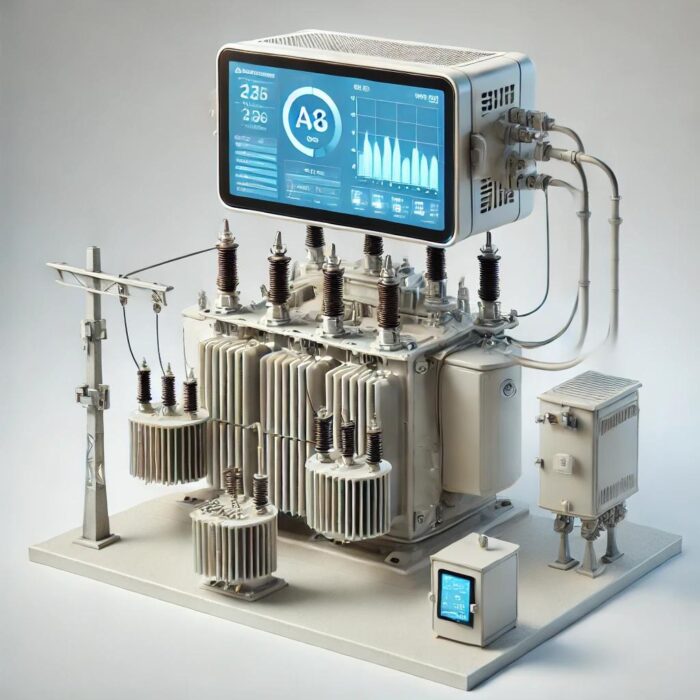
Common Causes of Electrical Transformer Failure
Electrical transformers are intricate systems requiring seamless coordination and regular maintenance for smooth operation. Yet, failures occur due to mechanical faults, electrical issues, and human errors. Identifying weak links isn’t always straightforward.
Introducing TransMonix
TransMonix, our AI/ML-driven and cost-effective Distribution Transformer Remote Monitoring and Diagnosis solution, provides real-time insights into transformer health. Powered by advanced machine learning algorithms, it continuously analyzes critical parameters like voltage, current, oil temperature, and winding temperature. By leveraging AI-based predictive analytics, TransMonix detects anomalies early, preventing failures before they occur.
The system securely transmits sensor data to the cloud, allowing for remote access and real-time monitoring. Its intelligent AI engine identifies deviations—such as overheating or electrical imbalances—and sends instant alerts to your laptop or phone. This AI-driven predictive maintenance reduces manual inspections, enhances reliability, optimizes operational efficiency, and extends transformer lifespan, ensuring a more stable and efficient power distribution network.


How TransMonix works
TransMonix, our AI- and ML-powered IoT-based Distribution Transformer Monitoring Solution (DTMS), ensures efficient and proactive transformer management. It continuously collects real-time data through high-precision sensors and securely transmits it to the cloud via a SIM card, enabling seamless remote monitoring from any location. By providing instant insights into transformer conditions, TransMonix detects potential issues before they escalate into failures.
Unlike traditional scheduled maintenance, TransMonix uses AI-driven condition-based monitoring, triggering alerts only when needed. This data-driven approach optimizes resource allocation, reduces downtime, and enhances transformer reliability. Leveraging real-time analytics, businesses can prevent unexpected failures and extend the lifespan of critical electrical infrastructure.
Benefits of using TransMonix

Overload Protection

Thermal Protection
Transformer overloading is a leading cause of failure, but IoT sensors help detect early signs before issues escalate. Key parameters monitored include voltage, current, frequency, active and apparent power, unbalanced loading, power factor, oil temperature, and winding hotspot temperature.

Identify Early Indicators
IoT sensors in the transformers use machine learning algorithms to identify early indicators of impending issues in the bushing. The algorithm analyzes any discrepancies in data patterns that may indicate the onset of a bushing failure.

Cooling Protection
Monitoring key parameters such as voltage, current, frequency, power, oil temperature, and winding hotspot temperature ensures effective cooling protection. Additionally, tracking low and high oil levels, ambient temperature, and unbalanced loading helps prevent overheating and enhances transformer reliability.

Others
IoT sensors enable early detection of potential issues. By monitoring voltage, current, frequency, power, oil temperature, and winding hotspot temperature, cooling protection is enhanced. Additionally, tracking oil levels, ambient temperature, humidity, and GPS location helps optimize maintenance, prevent overheating, and improve transformer reliability.

Early Overload Detection
Transformer overloading is one of the key reasons for its failure. IoT sensors make it possible to identify signals of possible overload before the problem goes out of control.
Blogs

How IoT is Revolutionizing Transformer Monitoring and Maintenance
Electrical transformers are vital for power distribution but face failures due to insulation breakdown, overheating, and mechanical wear. IoT-driven solutions enable real-time monitoring,...

How AI is Reshaping Transformer Monitoring
AI is transforming transformer monitoring by enabling real-time insights, predictive analytics, and proactive maintenance. AI-driven solutions like TransMonix detect faults early, reduce downtime,...

How TransMonix Works: Revolutionizing Transformer Monitoring with AI and IoT
TransFlux, an AI-powered IoT-based transformer monitoring solution, provides real-time data, predictive insights, and proactive maintenance. It enhances reliability, reduces downtime, optimizes performance, and...







